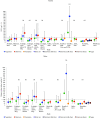Systematic review and meta-analysis of iodine nutrition in modern vegan and vegetarian diets
- PMID: 36912094
- PMCID: PMC10551477
- DOI: 10.1017/S000711452300051X
Systematic review and meta-analysis of iodine nutrition in modern vegan and vegetarian diets
Abstract
Vegan and vegetarian diets are widely supported and adopted, but individuals following such diets remain at greater risk of iodine deficiency. This systematic review and meta-analysis was conducted to assess the iodine intake and status in adults following a vegan or vegetarian diet in the modern day. A systematic review and quality assessment were conducted from October 2020 to December 2022 according to Preferred Reporting Items for Systematic Reviews and Meta-Analyses (PRISMA) and Meta-analysis of Observational Studies in Epidemiology (MOOSE) guidance. Studies were identified in Ovid MEDLINE, Web of Science, PubMed, and Scopus. Eleven articles were eligible for review containing 4421 adults (aged ≥ 18 years). Vegan groups had the lowest median urinary iodine concentration (mUIC) (12·2/l). None of the dietary groups had mUIC within the optimal range for iodine status (100-200 µg/l) (WHO). Vegan diets had the poorest iodine intake (17·3 µg/d) and were strongly associated with lower iodine intake (P = < 0·001) compared with omnivorous diets. Lower intake in vegan diets was influenced by sex (P = 0·007), the presence of voluntary or absence of Universal Salt Iodisation (USI) programmes (P = 0·01 & P = < 0·001), and living in a country with adequate iodine nutrition (P = < 0·001). Vegetarians and particularly vegans living in countries with no current USI programme continue to have increased risk of low iodine status, iodine deficiency and inadequate iodine intake. Further research into the usefulness of mandatory fortification of vegan appropriate foods is required.
Keywords: Iodine; Iodine intake; Micronutrients; Vegan; Vegetarian.
Figures







References
-
- The EAT-Lancet Commission (2022) The Planetary Health Diet – EAT 2022. https://eatforum.org/eat-lancet-commission/the-planetary-health-diet-and... (accessed August 2022).
-
- Martinelli D & Berkmanienė A (2018) The politics and the demographics of veganism: notes for a critical analysis. Int J Semiot Law 31, 501–530.
-
- YouGov (2022) Meet Britain’s Vegans and Vegetarians. https://yougov.co.uk/topics/lifestyle/articles-reports/2022/01/20/meet-b... (accessed August 2022).
-
- Phillips F (2005) Vegetarian nutrition. Nutr Bull 30, 132–167.
Publication types
MeSH terms
Substances
Grants and funding
LinkOut - more resources
Full Text Sources

